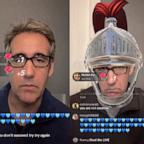Salman Rushdie speaks of stabbing that almost claimed his life: 'Taking power back'
"It became my way of controlling the narrative," he said of his book.
The attack lasted 27 seconds, but writer Salman Rushdie said in that short amount of time he experienced the worst and best of humanity.
In an interview Monday with ABC News' "Good Morning America" co-anchor George Stephanopoulos, the 76-year-old author of the new book "Knife: Meditations After an Attempted Murder" recounted the 2022 attack on him at an event in Chautauqua, New York, that nearly cost him his life.
Rushdie said he believed he was going to die, but then people who witnessed the attack rushed to protect him. His new book chronicles the harrowing aftermath of the attempt on his life, his long road to recovery and how his wife, Eliza, became the heroine of his story for nursing him back to health.

"No question," he told Stephanopoulos. "I mean, lying there in this lake of blood, which was mine and was expanding, I remember thinking in a completely calm way, Oh yeah, I think I'm dying. And then, fortunately, I was wrong."
Rushdie said he initially didn't want to write about the horrific experience but soon realized he had to. Writing "Knife," which will be available in bookstores on Tuesday, was his way of "taking the power back."
"It became my way of controlling the narrative if you'd like," Rushdie said. "What I felt is that the book itself, I mean, it's about a knife but it also kind of is a knife. I don't have any guns or knives, so this is the tool I use. And I thought I would use it to fight back."
On Aug. 12, 2022, Rushdie was speaking at the Chautauqua Institution about violence against writers when the knife-wielding suspect, 24-year-old Hadi Matar, charged the stage and allegedly stabbed the writer more than a dozen times. Matar has pleaded not guilty to second-degree attempted murder and assault charges in connection with the attack.

It had been more than three decades since Rushdie faced death threats over his novel "The Satanic Verses," which was inspired by the life of the Islamic prophet Muhammad and was published in 1988. The book was deemed blasphemous by Khomeini and an insult to Islam. Khomeini issued a fatwa, or death sentence, against Rushdie.
Rushdie said Monday that he believed threats against his life had faded.
"I've been living here, George, close to 25 years in New York City and in that time, I've done hundreds of public events, you know, book tours, literary festivals, reading, lectures," Rushdie told Stephanopoulos. "And there's never been a hint of a problem until this time."
While his book is largely about the assassination attempt and his recovery, he said it is also a love story.
"I always thought there were three people in this book. There's me, there's him, who I refuse to use his name," he said of the suspect. “And there’s my wife, Eliza. We had met five years before this attack took place."

"She was just astonishing in taking care of me and then looking after things and taking charge of things," said Rushdie, adding, "and bringing me back."
In the "GMA" interview, Rushdie said he had a premonition of the attack that came to him in a "bad dream."
"You can explain the bad dream because the place I was giving the lecture was called an amphitheater. So I had a dream about being in an amphitheater, except in my dream it was like the Colosseum. It was like a Ridley Scott movie," Rushdie said. "And there was a gladiator with a spear stabbing downwards and I was rolling around on the ground. And I woke up from the dream quite alarmed and, at first, I thought, 'Oh, I don’t want to go.' And then I thought, 'don't be stupid' it was a dream, you don't run your life because you had a bad dream."
Rushdie, who bears scars from the attack on his face and is blinded in his right eye, recalled how time "became a very weird thing" during the stabbing and its immediate aftermath.
"It seemed to go very fast at moments ... and to me like an eternity at other times," Rushdie said. "I had a very weird experience of time in that extreme situation."
Rushdie, who has publicly identified as an atheist, said the near-death experience made him briefly believe in the supernatural.
"For a minute it did, and then it didn't, and maybe it should have," Rushdie said.
As far as his health goes, he told Stephanopoulos, "I'm alright. I think I'm, to my surprise and I think to everybody else's surprise, pretty well."
Matar, of New Jersey, was initially scheduled to go on trial in January, but his attorney was granted a delay to review the manuscript of Rushdie's book.
Rushdie said he plans to testify at the trial whenever it occurs.
"I believe the DA wants me to testify and so I will," Rushdie said. "That's OK. There's nothing I will say on the witness stand that I haven't already said in this book."
Editor's note: Officials previously said the attack on Rushdie was an "apparent assassination attempt" by "an individual with strong indicators of ideological support for the Iranian regime," but they did not specifically say the attack was motivated by the fatwa imposed on Rushdie in 1989 by Ruhollah Khomeini.




